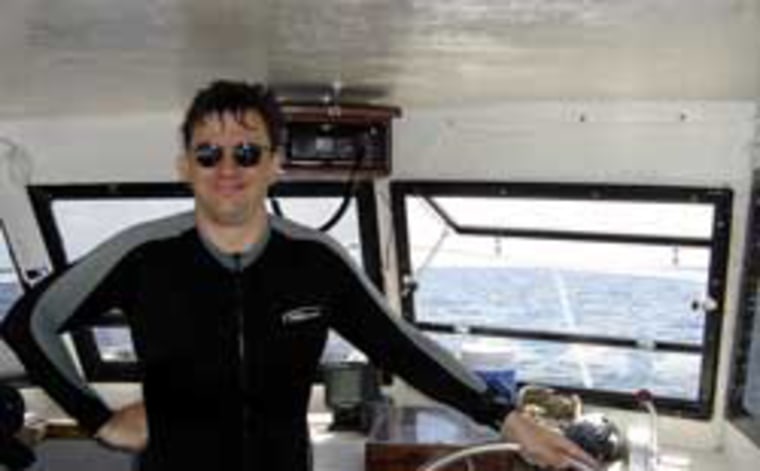• August 30, 2005 |
I never reproduce posts from my here, but this time I'm going to make an exception, with this list of charities you can donate to in support of hurricane relief in Louisiana, Mississippi, and Alabama. Katrina has turned out to be a lot worse than we thought on Monday, and a lot of people need help.
Here are some places you can go to donate to hurricane Katrina relief:
is involved, and probably has lots of resources to draw on in the heavily Catholic New Orleans area.
Austin Bay is recommending .
Liz at Rightalk suggests that animal lovers donate to the .
Here's a link to . The Sanity Inspector says they're highly efficient.
Reader Peter Viditto recommends The Mercy Corps.
Here's the link for .
The does good work. (WalMart just gave them , but that's just the barest beginning of what's needed.)
Hugh Hewitt recommends Samaritan's Purse.
Scott Ott recommends .
Jay Allen has a further suggestion:
I would suggest people donate through their companies whenever possible. Most major corporations offer matching funds to the dollar for charitable donations. Find who's collecting money for relief efforts, then file for a match through your employer instead of sending to the agency directly.
Not bad -- if your employer is supporting this.
Chuck Simmins is .
Technorati Tags: ,
• |
The wages of hurricane hypeAs I write this Hurricane Katrina is still bearing down on New Orleans and the surrounding Gulf Coast, and short of a miracle tomorrow will see some fairly results. I hope that you'll consider giving generously to hurricane relief efforts, and I'll be posting more about that later.
But right now, I want to take note of the people who stayed behind. Some -- especially those who don't speak English -- didn't get the word. Others, for one reason or other, just couldn't get out. But far too many just chose to stay behind. As hurricane-blogger writes: "Fox News is interviewing a bunch of people who are going to be dead in 24 hours. They're planning on staying put on the Mississippi coastline and riding out the storm. They have no f***ing clue."
Well, God supposedly looks after fools and drunkards, and after watching some of the coverage from Bourbon Street, I'd say He will have his hands full tomorrow. But though some people might want to, in the words of Larry Niven and Jerry Pournelle, "think of it as evolution in action," I think there's another issue here: The wages of hurricane hype.
News outlets generally, and cable news channels in particular, tend to . But while I hope that this will just be another case of media hysteria, I can't help feel that the previous wolf-crying played a major role in people's complacency.
If things turn out as badly as feared, complacency won't be a problem for a while. But I hope that people in the press will remember the wages of crying wolf in other contexts. Too much hype, and people tune out.
More hurricane-blogging can be found and .
• |
DJ sexism, a victimless crime... literally
A REALLY IMPORTANT ISSUE: Female DJs and Sexism
is making fun of this article on the plight of . She's probably right to.
I like what one of my favorite DJs, , says about the challenges (or lack thereof) that women face within the :
Reid doesn't particularly lean toward all-female events. "Well, I dunno; it's kind of stupid," she says. "It is a gimmick. Girls don't need it. Girls are already over-recognized for what we do. It's not necessary. You don't see 'All Guy Parties' advertised. I mean, how would your turnout be for 'Dicks on Decks?'"
Depends on where you're holding the event, I guess... And how can you write on female DJs without mentioning Of course, if you did, you'd have to note on the topic, which isn't very victim-like either:
Synthtopia: What issues have you had to deal with that are unique to being a female DJ?Lisa Lashes: Actually, everyone has always been supported. I've never experienced any negative attitudes towards me neither from the clubbers nor the promoters.
Oops. So much for playing the victim card.
• August 25, 2005 |
Getting around the blogosphere
It's nice that you're visiting GlennReynolds.com and MSNBC. But you might want to get out more. If so, the blogosphere is providing all sorts of opportunities, via various blog carnivals that round up all posts by lots of different bloggers. The carnivals and associated posts make for good reading, but the main benefit is that they help you find new bloggers you might otherwise have missed. Here are a few you might want to check out.
The rounds up posts by libertarian-oriented bloggers. The is for business and economics-related posts, while the is for people blogging about their own money.
One of my favorites is the , featuring posts by futurists and scientists. There's also a . There's a , and a . There's also , a carnival of women bloggers. And that's just a beginning.
Over at The Truth Laid Bear, there's an that collects even more. Just poke around in the ones that interest you. And at our sister site, Slate, there's a daily feature called that collects posts from a lot of different blogs and bloggers, too.
It's a big blogosphere. Don't limit yourself to the same neighborhoods all the time.
• |
War prompts political split
The Washington Post reports that the Democratic Party is :
Democrats say a long-standing rift in the party over the Iraq war has grown increasingly raw in recent days, as stay-the-course elected leaders who voted for the war three years ago confront rising impatience from activists and strategists who want to challenge President Bush aggressively to withdraw troops.Amid rising casualties and falling public support for the war, Democrats of all stripes have grown more vocal this summer in criticizing Bush's handling of the war. A growing chorus of Democrats, however, has said this criticism should be harnessed to a consistent message and alternative policy -- something most Democratic lawmakers have refused to offer.
As Lennon and McCartney sang to the boomers decades ago, "We'd all love to see the plan." Now, as then, it isn't forthcoming. And this is a problem. As Ann Althouse :
Should Democrats bring back the Vietnam era anti-war imagery, with folksinging gatherings and get-out-now rhetoric? I can understand wanting to express yourself that way if that's what you feel, but you know it didn't win elections back then.
In fact, as my co-blogger Eric Alterman has noted, the anti-war protests of that era probably actually increased support for the war (the vilified Nixon won in a landslide, after all). This may explain why Karl Rove seems unworried by all the publicity over Cindy Sheehan. ( polling data may explain that, too.)
But for Bush the bigger problem has to do with fatigue among his supporters. Bush has repeatedly warned that the war would be long and tough, and that much of what was going on wouldn't show up in the news. But nonetheless, fatigue sets in with time -- contrary to the rhetoric of some peace protesters, few people actually like war in and of itself, and most people want to see progress. (In fact, some of the fatigue among Bush's supporters stems from concerns that he's not waging war hard enough.)
Is this a problem for Bush? It's too early to say -- Bush's position traditionally flags during the summer, with supporters complaining of malaise, only to see the Administration go back on-message after Labor Day. Will it happen again? It had better, if Bush wants to succeed.
• August 19, 2005 |
Stem cells and space: A twofer!
If you read this spot regularly, you know that I'm interested in science, and particularly in stem cell research, and space exploration. Now it seems that the two may have :
Microgravity technology developed by NASA can multiply stem cells from a newborn's blood in large enough quantities to be used to regenerate human tissue, London scientists have found. Researchers at U.K.-based Kingston University have discovered primitive stem cells in the umbilical cord blood of infants that are similar to those from human embryos, which can be used to develop into any tissue in the body. The newly discovered human cells, called "cord-blood-derived embryonic-like stem cells" or CBEs, are more versatile than adult stem cells, found in bone marrow, which can mend damaged tissue during life. . . .Synthecon, a NASA spin-off company based in Houston, originally developed the microgravity technology 10 years ago for use aboard the International Space Station to test plant and cancer cells. The bioreactor is a cell-culture system designed to create a microgravity environment that allows cells to reproduce.
Space supporters in the 1980s promised much for microgravity research, and it appears that it's finally starting to pay off. There's a lesson in that.
This also suggests that the debate over adult vs. embryonic stem cells is premature. (For a useful survey of that debate, go .) The fact is that the science is still young, and those who argue that embryonic stem cells are the only way to go, or that adult stem cells are clearly superior, don't really know what they're talking about. In fact, they may both turn out to be wrong, thanks to this spinoff from space research. Stay tuned, because the science is still underway.
• |
The Cayman environmentI mentioned yesterday that the Cayman Islands have done a good job of balancing development with environmental concerns. It's worth noting, though, that there are still tensions.
The biggest source of local tension is the cruise ship industry. Grand Cayman has been a major cruise-ship destination for years. (The sister islands of Little Cayman and Cayman Brac are too small.) But until a couple of years ago it was unusual to see more than one or two cruise ships at a time. Now the numbers have skyrocketed. As you can see if you look at the for coming months, there will often be as many as 9 ships in port at once.
The cruise ships aren't good for the reef, locally -- the turbulence stirred up by their engines has damaged the reef near the harbor, which until recently was still quite nice -- and they flood the island with tourists who crowd Georgetown and the roads and facilities elsewhere. (The of all three islands put together is only 44,000, of which around 35,000 are on Grand Cayman. That means that 9 ships delivering 2,000 passengers each can increase the total population of the island by 50%.)
Locals are divided on the matter. The ships bring in a fair amount of money for the Cayman government, which is especially anxious for funds because of the hurricane reconstruction, and all those tourists buy things at the shops in Georgetown and at various other destinations along the beach. On the other hand, as some Caymanians like famed diver have been noting for a while, the crowding harms the environment, and makes the Island less appealing for other kinds of visitors, who stay longer and spend more money. (The hot dispute at the moment revolves around the construction of a Dolphinarium to attract cruise ship visitors. Local divemasters are circulating a petition against it, as dolphins aren't native to those waters, and would have to be imported from elsewhere. They also feel that there are too many cruise ships as it is.)
To me, the cruise ships seem like too much of a good thing. I've been happy to see the island become more prosperous since I first started going there in the 1980s. But looking at the packed crowds of cruise ship folks in the tourist district, well, they don't look like they're having much fun, and the lines at the shops look long enough that I'm not sure they're even managing to spend that much money. What's more, they're probably getting an entirely incorrect view of what Cayman is like — as if you visited Yellowstone but only visited the park gift shop — which probably makes them less likely to come back for an extended stay. Over the longer term, I suspect that the Cayman government will want to impose tighter limits on the number of ships visiting on any one day.
As always, people have to make choices, and balance short-term interests against long-term good. So far, the Caymanians have done a pretty good job, but it's an unending task.
• August 16, 2005 |
Disaster and recovery in paradise
I spent last week scuba diving in the Cayman Islands, a place I've been visiting for nearly twenty years. This was the first time I've been there since Hurricane Ivan hit, doing enormous damage, and it was interesting to see how the recovery has been going.

Ivan hit Grand Cayman dead-on, and the storm surge was such that most of the island was covered with water. It literally disappeared from radar screens. Nonetheless, thanks to excellent preparation, fatalities were few. There's still a fair amount of damage, and even some places that are back in operation aren't all the way back. (I stayed at Sunset House, a hotel that caters to divers, and the hot water in my room was mostly missing in action.) But things were still much better than I expected them to be.

In particular, the reefs were in excellent shape. I expected there to be a lot of hurricane damage there, but if anything they seemed cleaner and livelier than on my last visit, in March of 2004. (You can see a lot of excellent pictures of the Cayman underwater scene here.) The Cayman government, and the diving community there, has worked very hard to protect the reefs from environmental damage, and they're justly proud of the results. It's possible to balance tourism with environmental protection, and the Caymanians have done it for decades. I hope they'll manage to keep it up.

Word of the recovery hasn't reached a lot of the tourists, though, and the Caymanians wish that it would. So consider yourself informed.
• August 12, 2005 |
Guest blogging for Glenn this week is , an author and nationally-syndicated columnist with Creators Syndicate.
The necessity of nation building
The other day linked to a fascinating “” interview with Christopher Hitchens. The question that caught Totten’s eye caught mine as well: When asked if a Democrat were president on 9/11 would the "American left" have a different take on Afghanistan and Iraq, Hitchens replied:
…in the mainstream of the Democratic and Republican parties, you would have seen an exact switch…The ones in the middle would have just done a switch, finding arguments to support or criticize the war. In fact, I remember that people in the Clinton administration spoke of an inevitable confrontation coming with Saddam. They dropped this idea only because it was a Republican president. That is simply disgraceful. It is likewise disgraceful how many Republicans ran as isolationists against [former Vice-President] Al Gore in the 2000 elections.
I’ve argued —frequently— that a Democratic president would have been at most a year behind the Bush Administration’s track in the War on Terror, but ultimately following the same offensive strategy. After lag time for the psycho-drama of left-wing angst, President Gore would be carrying the war to the politically dysfunctional Arab Muslim Middle East-- creating and sustaining political alternatives to tyranny and terror. And that means nation building. Republicans, Democrats, and independents who opposed democratic nation building in the post-Cold War era were wrong in their assessment of what it takes to insure U.S. security.
As for Hitchens' “role reversal,” the spaghetti-spined members of the political class will always play the “nay game.” Angry accusations of incompetence, dereliction, and stupidity attract television cameras. A substantial number of conservatives supported democratic expansion and development—I know them, in part because I am one. (Note to Hitchens: none of us have “Marxist backgrounds.”) November 9, 1989 —that day the Berlin Wall cracked—presented liberal democracy with an extraordinary opportunity to change oppressive conditions throughout the world. Some of us took barbs from left and right wing isolationists – to the Left we were imperialists, to the Right, do-good dreamers.
In the 1990s I doubted Clinton’s decisiveness and his interest in sustaining military, political, and economic commitment, though I hoped for the best. I’ll give two examples from my own paper trail: In 1993 I wrote for The Houston Chronicle and Dallas Morning News urging the Clinton Administration to take focused military and political action in the Balkans and pinpointed Milosevic as the target. Clinton would have won a Nobel Peace Prize if he had followed through on his campaign rhetoric of 1992 regarding the Bush Administration’s neglect of Bosnia. In 1998 one of my Morning Edition commentaries urged the Clinton Administration to conclude Desert Storm—Hitchens' “inevitable confrontation” with Saddam.
The truth is, after 9/11 we’re not engaged in nation building – we’re engaged in planet building (). I completely agree with Hitchens on this point. We should “consistently act” against internationalist totalitarian ideologies out of both principle and realism. “…[I]f you don’t fight them now you fight them later... We can't live on the same planet as them and I'm glad because I don’t want to.”
That’s precisely why I went back on active duty and served in Iraq.
Bay’ 1993 essay can be found .